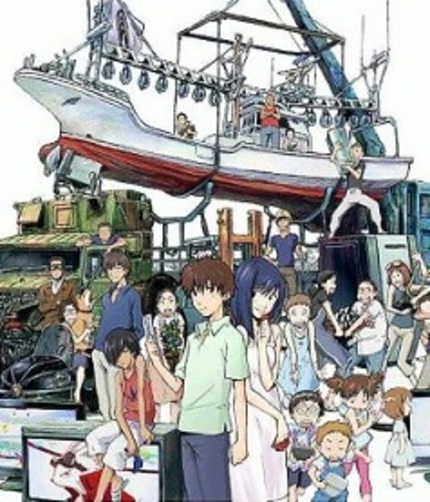LIFF '09: SUMMER WARS review

Virtual worlds as depicted in film and television can be something of a sore point for many people. It doesn't take a geek to realise filmmakers frequently find it hard to resist the temptation to jazz up technology, make it more visual, make it sexier. Films dealing with these subjects that strike a happy medium between realism and artistry are few and far between.
Surprisingly, Mamoru Hosoda's Summer Wars is definitely one of the minority. It's a thoughtfully drawn, almost tangible near-future that lifts from any number of recognisable real-world examples. Surprising because it's also a riotously silly, visually dazzling, hugely enjoyable genre mashup that firmly establishes Hosoda as one of the leading lights in Japan's animation industry.
The film takes place in a world where the majority of the Earth's population now spend most of their time logged into a monolithic virtual setting known as Oz. An opening flyby gives us the sales pitch - live, work and play here, conduct business, shop in branded arcades, decorate your online persona in gaudy outfits, so on, so forth.
Our hero is Kenji, the usual everyman highschool kid, a shy, unassuming young man who's spending his summer break working a menial tech support position for the giant corporation. Out of nowhere, Natsuki, the most popular girl in school asks him if he'd like to travel back home with her instead, to help out with her grandmother's upcoming ninetieth birthday.
Kenji jumps at the chance - it's an adventure, after all - but it quickly becomes apparent the girl has an ulterior motive. On top of that, when they finally arrive, before long the news is reporting something seems to have gone terribly wrong with Oz, and for some reason whoever's responsible has chosen to frame Kenji as the instigator of the resulting worldwide chaos.
Summer Wars is two films, then, a coming of age and a popcorn rollercoaster ride; both the slice-of-life elements and the science fiction build upon the director's debut, his excellent adaptation of Yasutaka Tsuitsui's novel The Girl who Leapt Through Time.
Hosoda seems intent on ramping up the scale of the production in every way he can, almost as if he were never going to get to make another movie. Both sides of Summer Wars are tremendously cinematic; the animation from studio Madhouse is not quite top-tier, but the art design more than makes up for any lapses. Oz is beautifully realised, clearly inspired by real-world virtual spaces, social networks and instant messaging, with just the right blend of wild experimentation and professionalism. The real world settings are similarly excellent, with some fantastic widescreen shots, high levels of detail and confident, assured direction.
At the same time, Summer Wars is obviously ridiculous. While it draws from reality there are no end of Independence Day moments here - none quite so off-the-wall as interfacing an Apple Mac with an alien mothership, but close enough.
This could have stopped proceedings dead (and it does hurt the story to some degree) but first and foremost Hosoda clearly wants to entertain. The narrative is fairly slight, but it charges ahead with the same childlike energy of his first film writ large, Hosoda throwing in everything he can think of - here some fight scenes, here some physical comedy, here some dazzling flight sequences, here some climactic explosions and so on, never self-indulgent or self-centred, always a pleasure to watch.
The character development serves to ground and temper all the mayhem - as in, let's take a break to remind ourselves why this is happening and to whom - and it works to an extent. The voice actors turn in some excellent performances, particularly Ryūnosuke Kamiki and Nanami Sakuraba (Kenji and Natsuki), though it's hard to dislike any of the cast. This is very much a family film, where there's no out-and-out villain, no lasting sense of peril and little beyond basic emotional issues.
Though this is also where Hosoda falls down. For all the plays on emotional bonds, acquiring maturity, for all the artistic prowess and wide-eyed visual trickery Summer Wars struggles to add up to even the sum of its parts. There's no deeper themes here, no real characterisation or even a solid moral underpinning everything - it's the one way the film doesn't build on The Girl... and it leaves the climax naggingly frustrating. Pitch-perfect leads and wild visual invention can't stop Summer Wars from feeling oddly empty.
It is still very much worth watching; part of the director's obvious talent is that even a film that never quite lives up to its potential comes in way ahead of much of the competition. Suspend your critical faculties just a little and there's plenty to love here, much of it that could easily stand repeat viewing. It bears noting Summer Wars falls noticeably short of absolute greatness, but Mamoru Hosoda's second film still comes highly recommended.
Summer Wars
Director(s)
- Mamoru Hosoda
Writer(s)
- Mamoru Hosoda (story)
- Satoko Okudera (screenplay)
- John Burgmeier (head writer)
- Patrick Seitz (script writer)
Cast
- Ryûnosuke Kamiki
- Nanami Sakuraba
- Mitsuki Tanimura
- Takahiro Yokokawa







